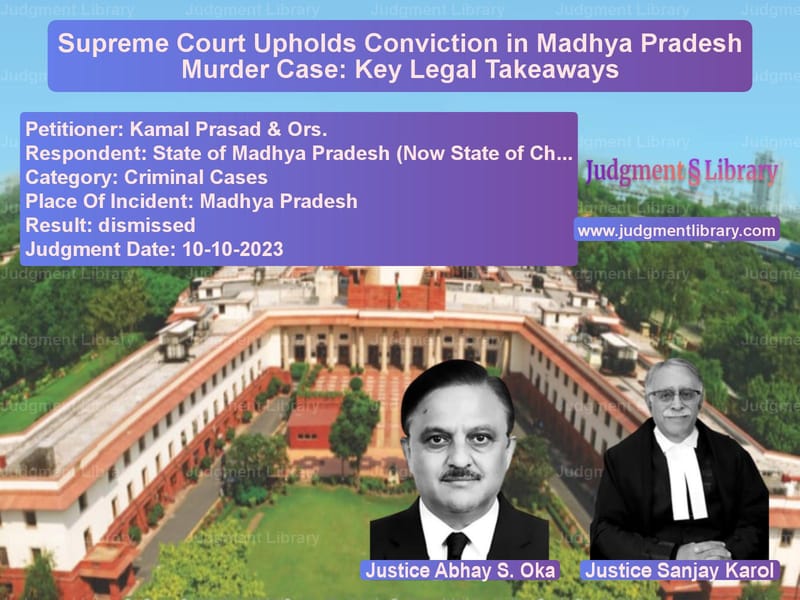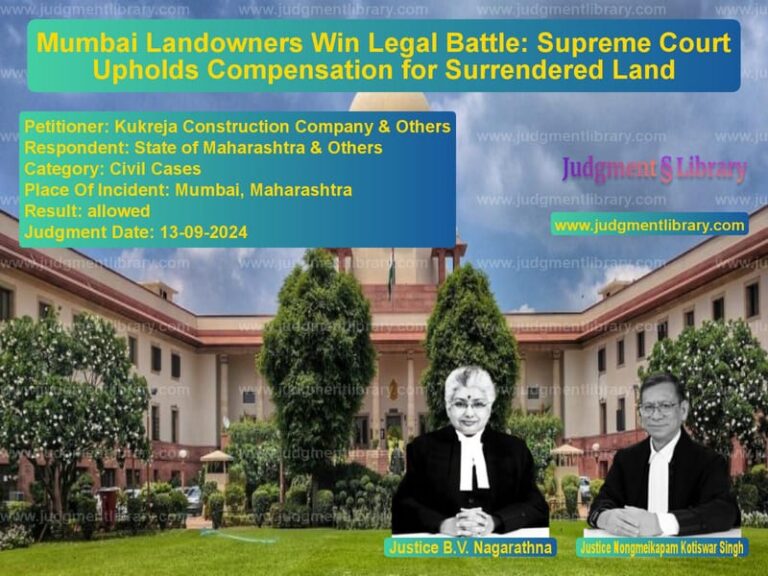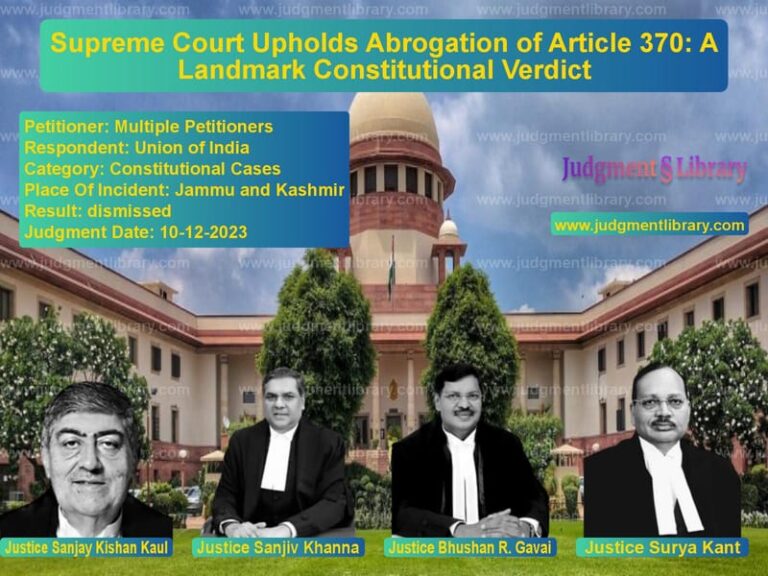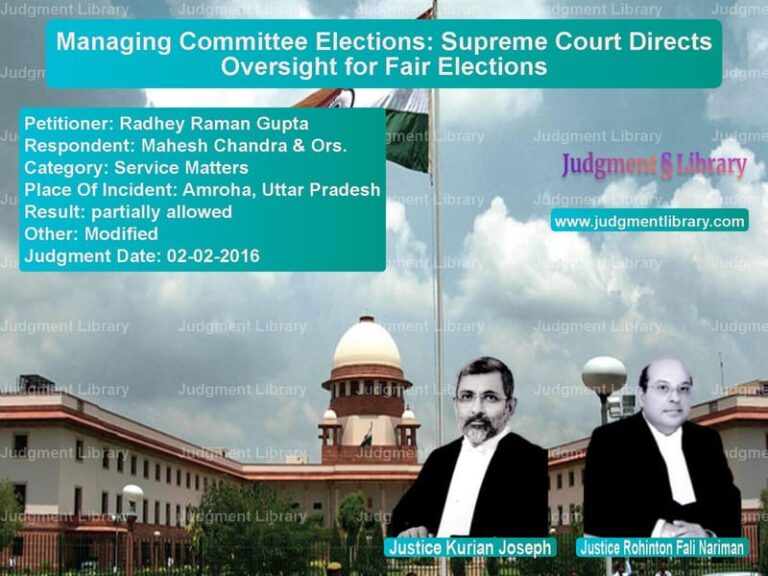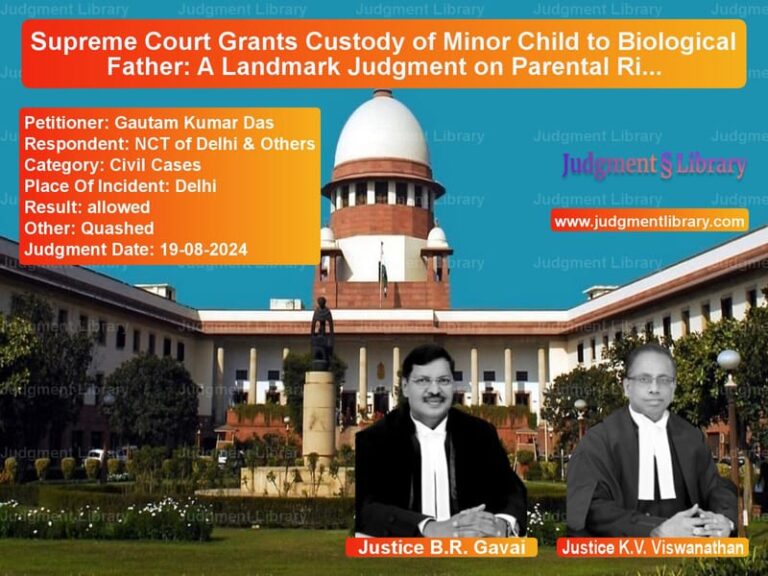Supreme Court Upholds Conviction in Madhya Pradesh Murder Case: Key Legal Takeaways
The Supreme Court of India recently delivered a significant judgment in Kamal Prasad & Ors. vs. The State of Madhya Pradesh (Now State of Chhattisgarh), upholding the conviction of the accused in a brutal double murder case that occurred in 1988. The case highlights key legal principles concerning common intention under Section 149 IPC, delay in FIR registration, plea of alibi, reliability of eyewitnesses, and sentencing proportionality.
The ruling reinforces the evidentiary value of eyewitness testimonies, the importance of prompt FIR registration, and the strict scrutiny required for an alibi defense. Here’s a detailed breakdown of the case, arguments presented, the Supreme Court’s observations, and the final judgment.
Background of the Case
On April 17, 1988, Chetram was taking his son, Kapildeo @ Guddu, to the hospital along with one Choubisram (PW-3) as a pillion rider. When they reached the house of accused Darasram, a group of 11 accused persons attacked them using country-made bombs, lathis, and tabbal. As a result:
- Chetram suffered multiple injuries and later succumbed to them.
- Kapildeo was found alive near a tree close to the incident but died the same day during treatment.
- PW-3 survived and later testified as an eyewitness.
The investigation led to the conviction of nine out of the eleven accused persons under Sections 148, 302 read with 149 IPC, 307 read with 149 IPC, and Sections 4/5 of the Explosive Substances Act, 1908. The conviction and sentences were confirmed by the High Court.
Petitioners’ (Appellants’) Arguments
The appellants, namely Kamal Prasad (A-3), Shersingh (A-6), and Bhavdas (A-9), challenged their conviction on the following grounds:
- Delay in FIR registration: The appellants argued that the delay in registering the FIR at 11:00 AM, despite the incident occurring at 8:00 AM, suggested fabrication and consultation.
- Contradictions in witness statements: They contended that the testimonies of prosecution witnesses (PW-3, PW-16, PW-17) had contradictions and could not be relied upon.
- Plea of alibi: The appellants claimed that they were not present at the scene and provided witnesses to support their alibi.
- Victim’s criminal background: The deceased Chetram was allegedly a history-sheeter, and the appellants argued that someone else could have been responsible for his murder.
Respondent’s (Prosecution’s) Arguments
The prosecution countered these claims with the following points:
- FIR was filed without delay: The incident occurred in a remote area, and PW-3 had sustained injuries and hid out of fear before approaching the police.
- Eyewitness accounts were consistent: The key witnesses, including PW-3 and the wives of the deceased (PW-16, PW-17), consistently described the attack and identified the accused.
- Common intention under Section 149 IPC: The manner of attack and weapons used demonstrated the accused acted in furtherance of a common unlawful objective.
- Plea of alibi was not proven: The defense witnesses did not provide conclusive proof that the accused were elsewhere during the incident.
Key Observations by the Supreme Court
The Supreme Court examined four critical legal issues in this case:
1. Delay in FIR Registration:
The Court ruled that the two-hour delay in filing the FIR was not unreasonable. The judgment stated:
“The time gap between the incident and FIR was due to the natural fear of the injured witness who took shelter. There is no evidence of fabrication or consultation.”
2. Reliability of Eyewitnesses:
The Court upheld the reliability of prosecution witnesses, particularly PW-3, who survived the attack. The judgment noted:
“The testimonies of PW-3, PW-16, and PW-17 are consistent on material aspects and corroborated by medical and forensic evidence.”
3. Plea of Alibi:
The Court reiterated that an alibi must be proven with certainty. The defense witnesses failed to provide corroborative evidence, and the accused were seen at the crime scene. The Court observed:
“A plea of alibi must be established with certainty, and here, the accused failed to prove their absence from the crime scene.”
4. Common Intention under Section 149 IPC:
The Court ruled that the sequence of events—throwing bombs, attacking with lathis and tabbal—proved a shared intent to kill the deceased:
“The accused were part of an unlawful assembly with a common object to commit murder, making Section 149 IPC applicable.”
Final Judgment
- The Supreme Court upheld the conviction of the appellants under Sections 148, 302 read with 149 IPC, 307 read with 149 IPC, and Sections 4/5 of the Explosive Substances Act.
- The sentences awarded by the Trial Court were confirmed, including life imprisonment.
- The appeal was dismissed, and the appellants were directed to surrender immediately.
Implications of the Judgment
This judgment reaffirms several key legal principles:
- Prompt FIR registration is not always necessary: A minor delay in lodging an FIR does not weaken the prosecution’s case if justified.
- Eyewitness credibility is paramount: Consistent and reliable witness testimonies carry significant weight in criminal cases.
- Plea of alibi requires strict scrutiny: Mere statements from defense witnesses are insufficient; the accused must prove their absence conclusively.
- Common intention under Section 149 IPC: Even if an accused did not individually inflict fatal injuries, participation in a group attack can attract murder charges.
Conclusion
The Supreme Court’s ruling in Kamal Prasad & Ors. vs. The State of Madhya Pradesh (Now Chhattisgarh) serves as a significant precedent in criminal jurisprudence. By affirming the convictions, the judgment emphasizes the need for robust evidence in criminal cases and strengthens the legal understanding of common intention under Section 149 IPC. The ruling ensures that individuals involved in group attacks with shared criminal intent are held accountable under the law.
Petitioner Name: Kamal Prasad & Ors..Respondent Name: State of Madhya Pradesh (Now State of Chhattisgarh).Judgment By: Justice Abhay S. Oka, Justice Sanjay Karol.Place Of Incident: Madhya Pradesh.Judgment Date: 10-10-2023.
Don’t miss out on the full details! Download the complete judgment in PDF format below and gain valuable insights instantly!
Download Judgment: kamal-prasad-&-ors.-vs-state-of-madhya-prad-supreme-court-of-india-judgment-dated-10-10-2023.pdf
Directly Download Judgment: Directly download this Judgment
See all petitions in Murder Cases
See all petitions in Attempt to Murder Cases
See all petitions in Custodial Deaths and Police Misconduct
See all petitions in Judgment by Abhay S. Oka
See all petitions in Judgment by Sanjay Karol
See all petitions in dismissed
See all petitions in supreme court of India judgments October 2023
See all petitions in 2023 judgments
See all posts in Criminal Cases Category
See all allowed petitions in Criminal Cases Category
See all Dismissed petitions in Criminal Cases Category
See all partially allowed petitions in Criminal Cases Category

